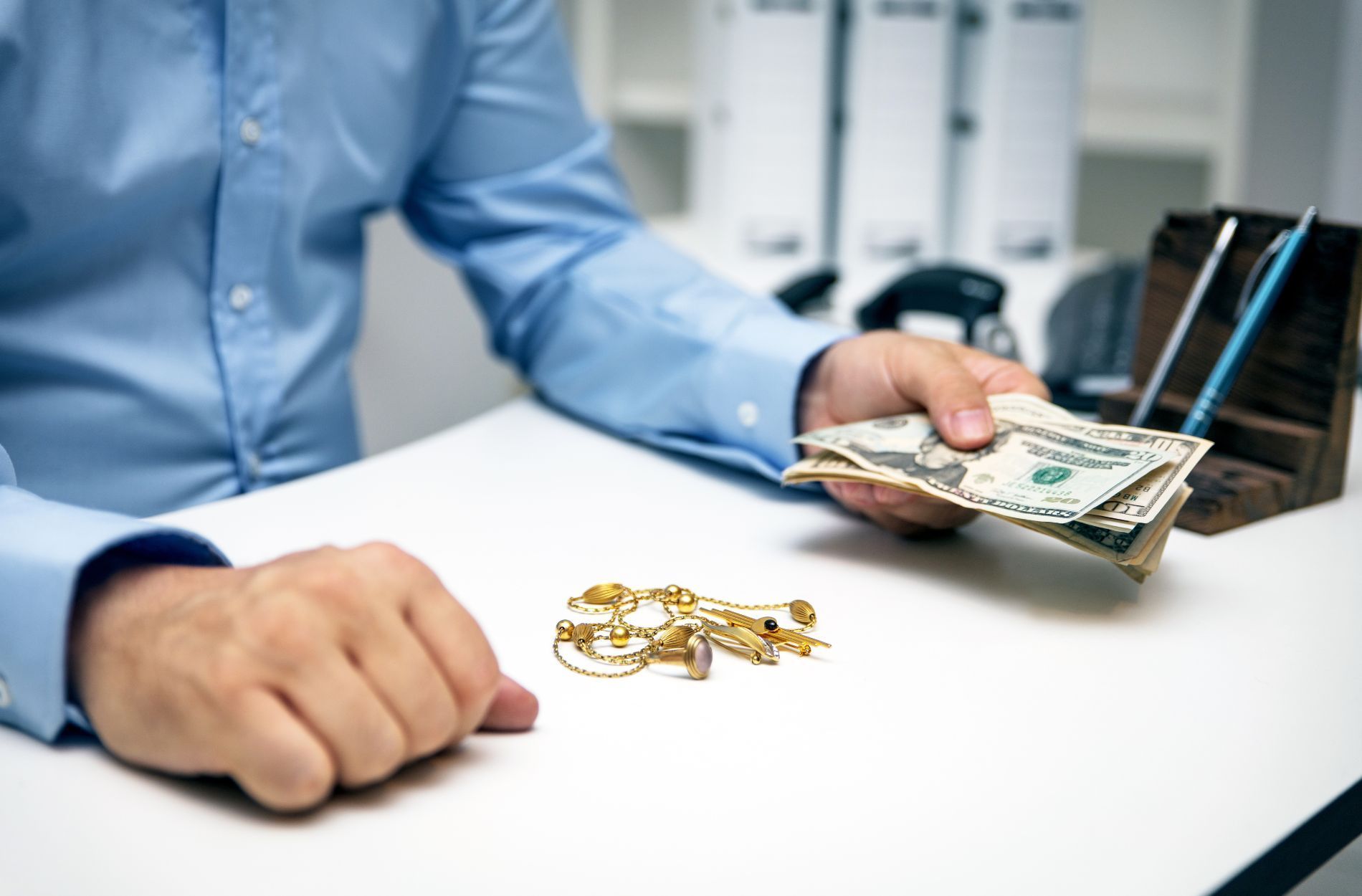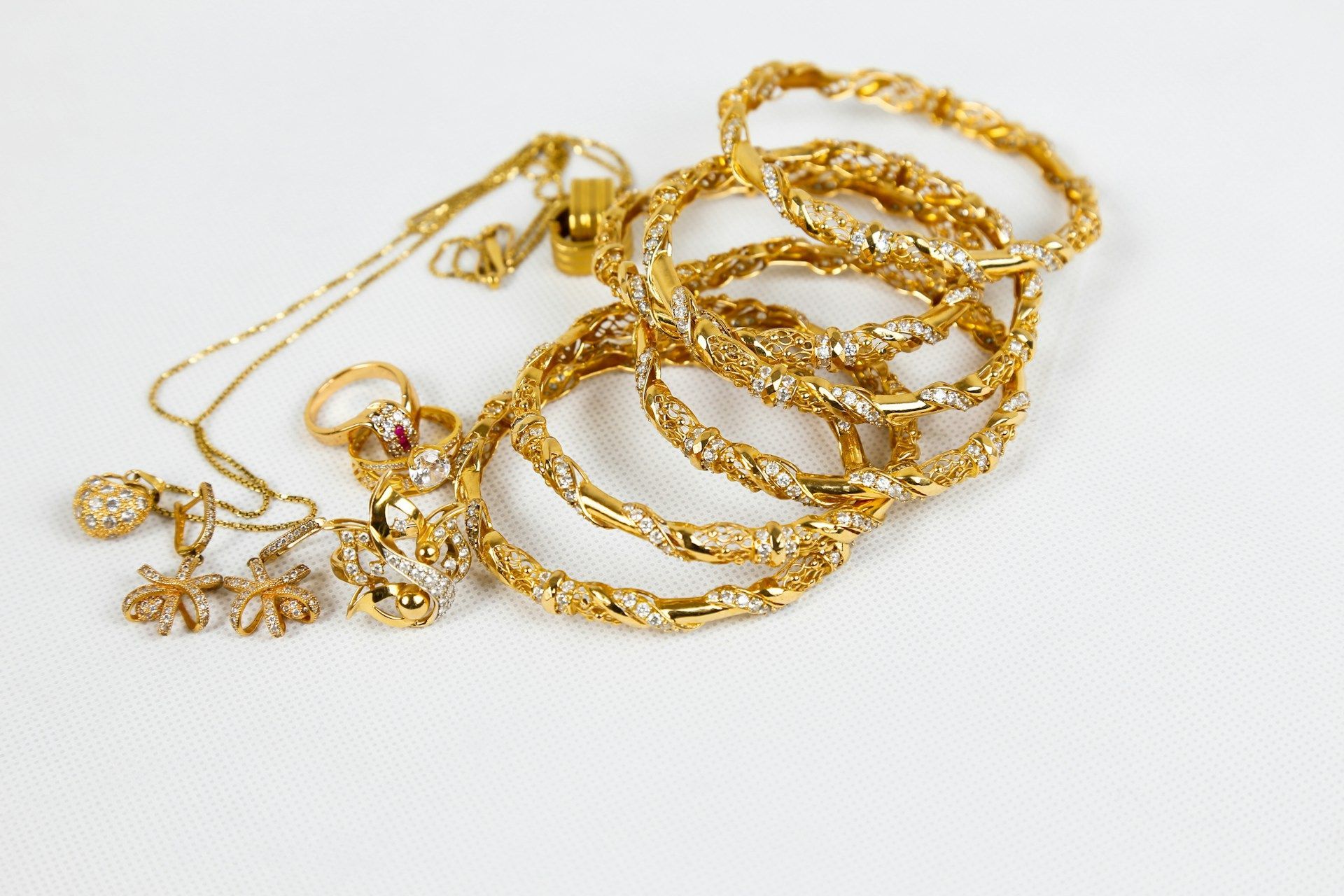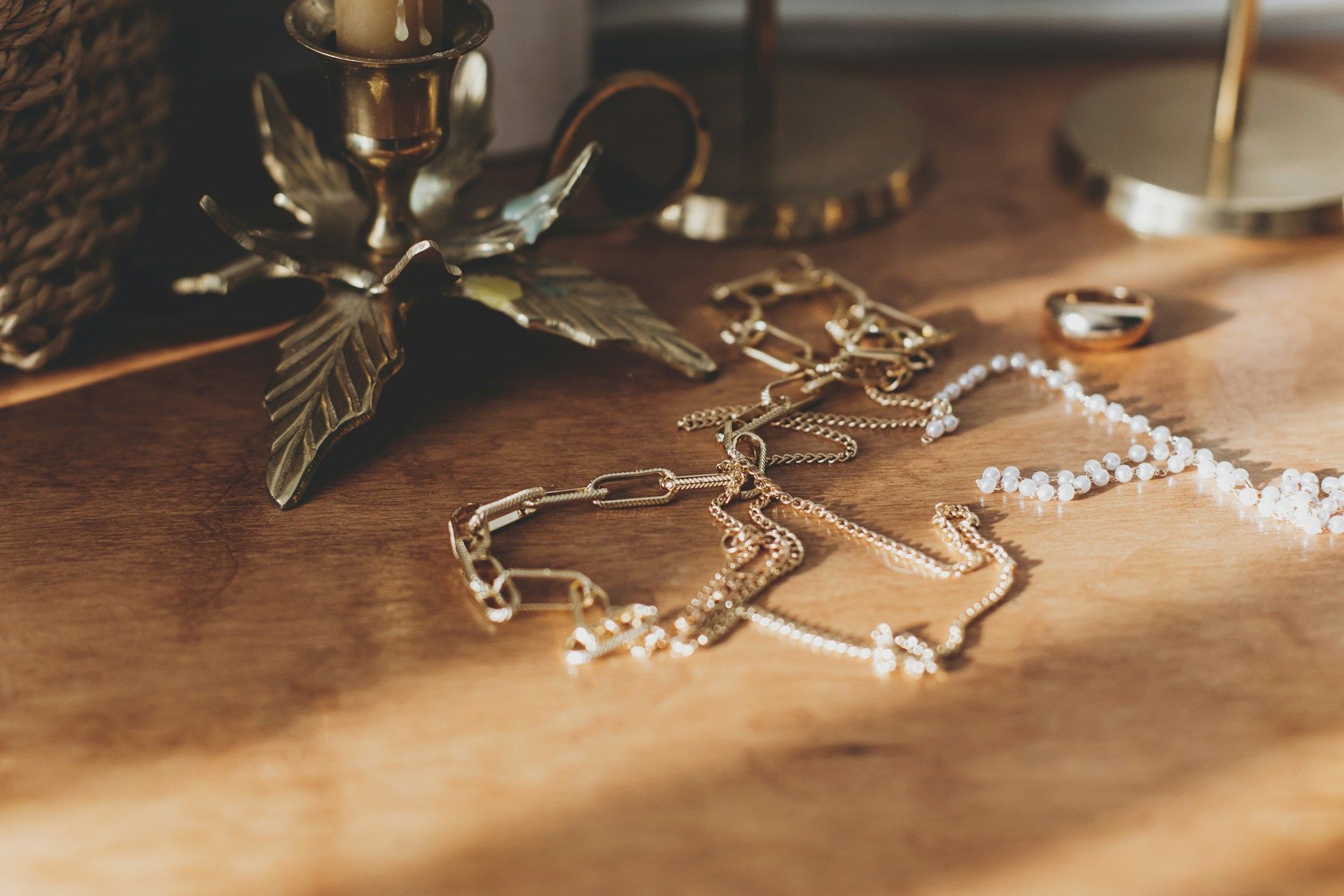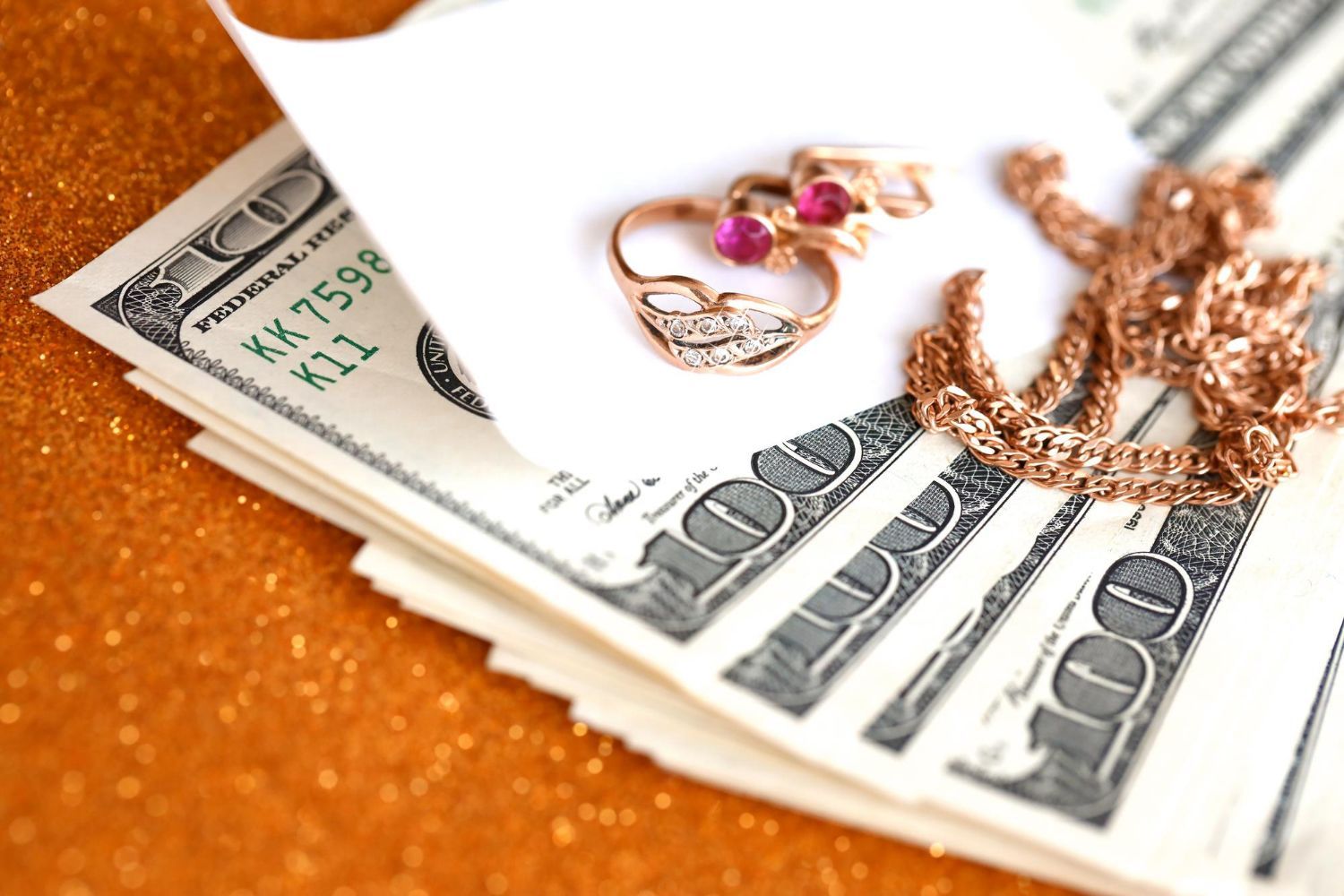Blog
Blog

April 4, 2025
Deciding whether to pawn or sell your valuables can feel a bit tricky. Maybe you're looking at your grandmother’s gold necklace and thinking about its sentimental value, while a diamond ring sits forgotten in a drawer, collecting dust and possibly losing worth. Each piece holds a story and offers different possibilities when you need some extra cash. The challenge lies in figuring out what option makes the most sense for you. Whether you're in a tight spot or just looking to declutter, knowing the ins and outs of pawning and selling can help. You'd want to make the best decision possible for yourself and your treasured items. The choice between pawning and selling comes down to your current situation and future needs. Are you hoping to get your item back soon, or are you ready to part with it forever? Understanding these options is key to making the right move. Both have their perks and pitfalls, so weighing them carefully can make all the difference. Let's explore what each option means and guide you through making a choice that suits your needs best. Understanding the Difference: Pawning vs. Selling When it comes to pawning, think of it as a temporary arrangement. You use your item as collateral for a loan, and after some time, you can pay back the loan with interest to reclaim it. Here's a quick breakdown of what pawning involves: - Bring your item to a pawn shop for an appraisal. - Based on the appraiser's evaluation, you'll receive a loan offer. - If accepted, you'll get cash, but the shop keeps your item until you pay off the loan. Pawning is ideal if you need quick cash but still want the chance to get your possession back. But remember, interest rates apply, and missing payments mean the shop keeps your item. On the other hand, selling is straightforward. You simply exchange your item for a one-time payment. It means parting with the item permanently, but it eliminates worries about loan repayments and interest fees. Selling is best when you decide you're ready to let go for good or if the item has outlived its sentimental value. Each choice comes with its own set of pros and cons. Pawning grants temporary relief while keeping future retrieval possibilities open. Selling gives you a clean break, leaving you with quick cash and one less item to think about. Whether you lean towards pawning or selling, knowing what your item is truly worth and how it fits into your plans helps pave the way to a decision that feels right for you. Factors to Consider When Deciding Choosing whether to pawn or sell relies on several factors that need careful thought. First, think about your immediate need for cash versus the long-term value of the item. If you’re looking for fast money but still see a future with your item, pawning might be your path. This way you reserve the chance to retrieve it once your financial situation stabilizes. However, if keeping it around won’t do you any good in the future, selling might be the better choice with no strings attached. Next, consider the sentimental value attached to your item. Items passed down through families or given as gifts can be hard to part with. Weighing this emotional factor is just as important. Also, realistically, assess if you're emotionally ready to permanently part with it. You might still feel a strong connection, making pawning a feasible option to keep that door open. Another critical aspect is the item’s condition and potential resale value. Items in great condition tend to fetch higher prices, which matters whether you’re pawning or selling. A diamond ring with a small scratch might lose some appeal in the selling market but could still be valuable collateral at a pawn shop. Take an honest look at whether your item could command a price worth the letting go. Benefits of Pawning or Selling Gold or Diamond Jewelry Gold and diamond jewelry holds unique perks when considering pawning or selling. Such items have sustained demand, making them reliable sources of cash. Their intrinsic value provides security in pawning, as these precious items typically maintain or even increase in value over time. This makes them attractive to both pawn shops for loans and potential buyers when selling. The precious metals market often fluctuates with gold prices seeing notable changes based on economic conditions. This situation is a good reminder to stay updated, as selling or pawning in a favorable market can significantly impact what you receive. Particularly in such times, the worth of your jewelry may allow you to tap into more cash than expected. Moreover, the elegance and timeless appeal of diamond pieces often mean they won’t stay unwanted for long. Whether it's stunning gold necklaces or exquisite diamond rings, these items usually draw interest, providing both flexibility and opportunity. Thus, understanding these key market dynamics and jewelry-specific aspects can steer you toward beneficial outcomes. Tips for Making the Best Decision at River City Pawn Making smart decisions about your valuables calls for a few handy tips. To start, take the time to research and prepare your items for appraisal. Clean and polish jewelry, present items in their best condition, and gather any documentation related to origin and authenticity. This effort can enhance an item's perceived value, showing your confidence in its worth. When visiting a pawn shop, such as one in Kentucky, approach the experience with clear expectations. Understand the terms of the pawn loan agreement or sale offer before committing to anything. Asking questions aids in feeling reassured about the process. Also, know that professionals at such establishments usually assess items by studying current market trends, so ensuring you're informed can bolster your negotiating power. Ultimately, whether you're in Kentucky or elsewhere, choosing to pawn or sell is yours to make with the assurance that the decision is aligned with both your financial and personal priorities. Stay open and informed, and you'll find the approach that adds value to your choices. When you're ready to make the decision about how best to utilize your valuables, consider pawning gold or diamond jewelry , as it could be a smart way to get the cash you need without parting with your treasures permanently. Visit River City Pawn for more information and explore the options that suit your circumstances. Discover how your jewelry can help bridge financial gaps by checking out our services.

February 25, 2025
Visiting a pawn shop can be a practical way to get quick cash or find a great deal on second-hand items. However, making the most of your visit requires some know-how to avoid common mistakes. Without the right preparation, you might end up with lower offers or unfavorable loan terms. Understanding the value of your items before setting foot in a pawn shop is crucial. Knowing what’s influencing the market can help you time your transactions for maximum benefit. Proper preparation goes beyond just guessing the worth; it involves cleaning and presenting items in their best condition. Moreover, successfully navigating a pawn shop visit involves effective negotiation and a clear understanding of the terms offered. By taking the time to learn about potential pitfalls and how to steer clear of them, you can boost your chances of leaving the shop satisfied and financially better off. Understanding Item Value and Market Conditions Before visiting a pawn shop, understanding the value of your items is crucial. Researching the potential worth of your items can give you an upper hand in negotiations and set realistic expectations. Knowing the estimated value prevents settling for less than what your items are worth. This process often begins with identifying the make and model, looking for serial numbers, and considering the condition of the item. Market trends can have a significant impact on pawn pricing. For instance, gold and silver prices fluctuate regularly with market conditions. Similarly, high demand for electronics or collectibles can drive prices up. By staying informed, you can choose the best time to pawn your items, ensuring you gain maximum advantage from current trends. To estimate the current market value of your items, use various resources. Start with online marketplaces to see what similar items are selling for. Auction sites can also provide a clear picture of what buyers are currently willing to pay. Additionally, guides and forums dedicated to specific collectibles can offer insights. By leveraging these resources, you equip yourself with knowledge that strengthens your position when negotiating at a pawn shop. Avoiding Poor Presentation of Items Presenting your items poorly can significantly reduce their perceived value. Many people overlook simple presentation aspects, affecting the offers they receive. Avoid common mistakes like bringing in dirty or damaged items. Instead, dedicate time to clean and restore your possessions as best as you can. Here are some tips for cleaning and presenting your items well: - Electronics: Wipe screens and surfaces with a soft cloth, remove any finger smudges, and ensure all parts and accessories are included. - Jewelry: Use a mild cleaning solution to polish gold and silver, and ensure stones are secure in their settings. - Collectibles: Dust off figures or memorabilia and handle them with care to prevent additional wear. Having documentation or proof of ownership is essential. These records provide authenticity and can increase buyer trust, leading to better offers. Gather any receipts, certificates of authenticity, or appraisal documents before your visit. Being thorough in these preparations shows the pawnbroker that you're serious, allowing you to maximize the value you receive. Negotiation Mistakes at the Pawn Shop Negotiation is a crucial part of visiting any pawn shop, but missteps can lead to less favorable deals. One common mistake is accepting the first offer without trying to negotiate. It's important to remember that a pawn shop’s initial offer often isn't the final word. Knowing the value of your item gives you a bargaining chip. Approach the negotiation with confidence, stating your researched value and being prepared to defend it. Communication is key. Misunderstandings can occur if both parties aren't clear about what each side is offering. Another mistake is failing to read the fine print. Make sure you understand the terms and conditions before sealing any deal, especially if your pawn involves a loan. Discuss any fees, repayment periods, and interest rates that might apply. Key Errors to Avoid: - Accepting first offers without negotiation. - Not clarifying all terms and conditions. - Overlooking fees and repayment details. Being informed and proactive during negotiations ensures you make the best possible deal, securing a fair exchange for your items. Overlooking Loan Terms and Repayment Plans When pawning items for a loan, it's vital to understand the terms involved. Too often, people underestimate the impact of interest rates and fees on the total repayment. Before agreeing to terms, ask about the interest rate and how long you’ll have to repay the loan. It's also important to understand what happens if you default on payments. Repayment plans vary from shop to shop. Some might offer more flexibility, so it’s crucial to discuss options that suit your financial situation. If you're not careful, short repayment windows or high-interest rates can lead to losing your item. Here are some common pitfalls to watch for: Common Pitfalls: - Agreeing to high-interest rates without understanding the cost. - Selecting a repayment plan that’s hard to manage. - Not asking about penalties for late payments. Managing your loan effectively involves understanding all these details and making sure they align with your ability to repay. This helps protect your items and financial well-being. Conclusion Visiting a pawn shop can be a smart financial move if done correctly. By avoiding common mistakes, you ensure a smoother transaction and better outcomes. Whether it’s negotiating the best price for your valuables or securing favorable loan conditions, being prepared is key. Swinging by River City Pawn could be the solution you’re looking for, whether you’re in need of a quick loan or hoping to get good value for your items. We pride ourselves on creating a welcoming atmosphere with fair and transparent dealings in the heart of Western Kentucky. Visit our River City pawn shop today to experience pawn transactions done right.

Locations in:
Owensboro, Henderson, Madisonville, Leitchfield, Murray, Princeton, KY
© 2025
All Rights Reserved | Website Designed and Developed By Oddball Creative







